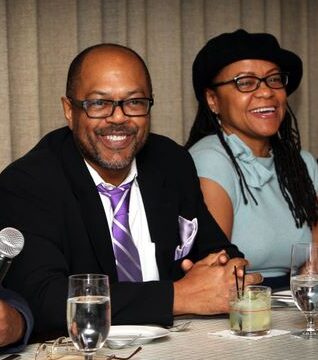Updated May 4
Raina Kelley in Top Spot at The Undefeated
Alcindor Named Moderator of ‘Washington Week’
Who Was Bernadette? Who Was Mrs. Jones?:
Journalists Hear From Philly Int’l, Motown Museum
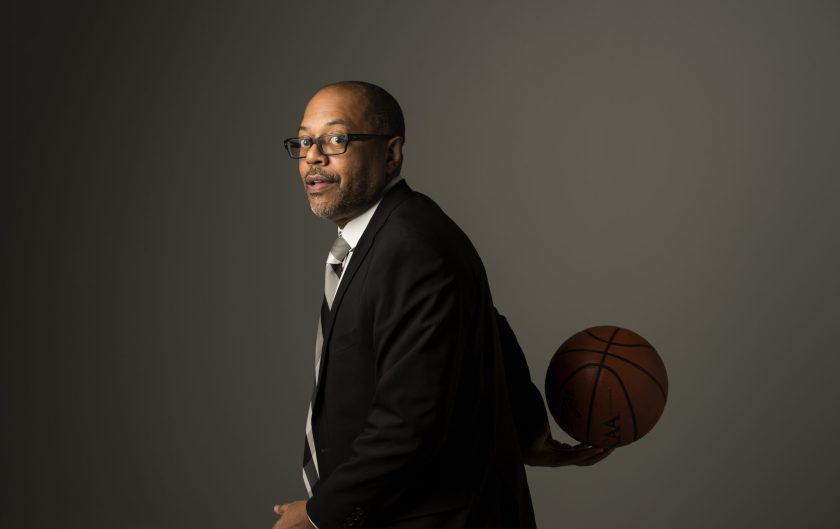
Raina Kelley in Top Spot at The Undefeated
The Los Angeles Times newsroom was described Monday as “cautiously optimistic” about the arrival of veteran journalist Kevin Merida as its new executive editor, while ESPN quickly promoted Raina Kelley, managing editor of The Undefeated, to Merida’s post as vice president and editor in chief of the Disney Co.’s initiative melding sports, race and culture.
 The guarded optimism description came from Michael Ottey (pictured), assistant editor of the National and Foreign Desk, whom Journal-isms asked for a reaction. “I think the staff, which has seen previous leadership do more harm than good, is feeling cautiously optimistic.”
The guarded optimism description came from Michael Ottey (pictured), assistant editor of the National and Foreign Desk, whom Journal-isms asked for a reaction. “I think the staff, which has seen previous leadership do more harm than good, is feeling cautiously optimistic.”
“We want to hear from Kevin and obviously work with him to lift the L.A. Times. I think Kevin can get the job done if he’s given the freedom and the resources to get it done. Too often we’ve seen people hired to do a job, but they enter with their hands tied. Hope that’s not the case here. We’ll see.”
The News Guild, under whose auspices the Latino Caucus, like the Times’ Black Caucus, issued demands last year to improve the newspaper’s racial climate, was likewise cautious.
The Executive Committee of the Media Guild of the West, NewsGuild-CWA Local 39213, said in a statement, “We congratulate Kevin Merida on his selection as editor in chief of the Los Angeles Times, and we commend Dr. [Patrick] Soon-Shiong and [his wife, Michele B.] Chan on the successful conclusion of their search for Norm Pearlstine’s replacement.
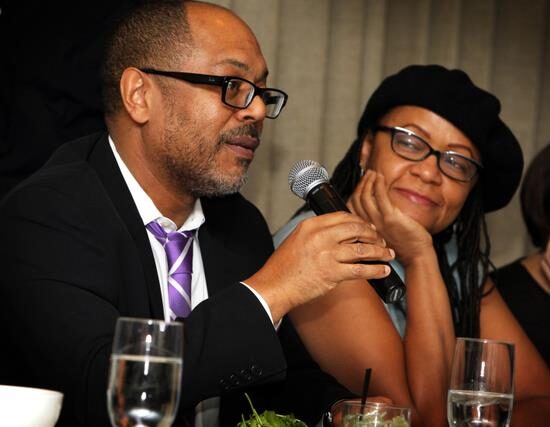
“Our members expect leaders with uncompromising commitments to quality, integrity and fairness, and we look forward to meeting with Kevin soon to hear his vision for the continued restoration of The Times. There is work to be done. We’re ready to partner with our new editor to get it done together.”
Merida, 64, spent more than two decades at The Washington Post, and has held a career-long interest in diversity, serving on the board of the Maynard Institute for Journalism Education as a 1979 graduate of the institute’s summer training program at the University of California at Berkeley.
Paul Farhi and Sarah Ellison reported in the Post, “The Times is one of several news organizations that have sought to fill their top newsroom jobs, and Merida’s name has surfaced as a candidate for several of them. Most notably, he has had discussions with The Post, which is seeking to replace its top editor, Martin Baron, who retired at the end of February.”
As an African American, Merida would be the third person of color in the top L.A. Times newsroom job, following Davan Maharaj, a native of Trinidad whose great grandparents came from northern India, and Dean Baquet, an African American who is now executive editor at The New York Times.
The L.A. Times’ own story, by Meg James, said that with “Merida’s hiring, Soon-Shiong took a step toward delivering on a promise to readers last fall to increase newsroom diversity, which the biotech entrepreneur called ‘mission-critical for our business.’
“ ‘Only a diverse newsroom can accurately tell this city’s stories,’ Soon-Shiong (pictured below) wrote in his September letter, noting that a more inclusive newsroom was integral to providing stronger coverage of ‘Black, Latino, Asian and underrepresented communities.’ ”
However, diversity will be only one of Merida’s concerns. James’ story continued, “Merida will be tasked with overseeing the traditional journalism that readers find essential, and help widen the aperture to include video, podcasts, community events, including the annual Festival of Books, the LA Food Bowl and other lifestyle companions, such as a recent Southern California hiking guide.
“The Times has struggled to make the transition to digital media, hobbled by years of management turmoil, layoffs and underinvestment when it was owned by Tribune Publishing, which called itself Tronc for a couple of years.
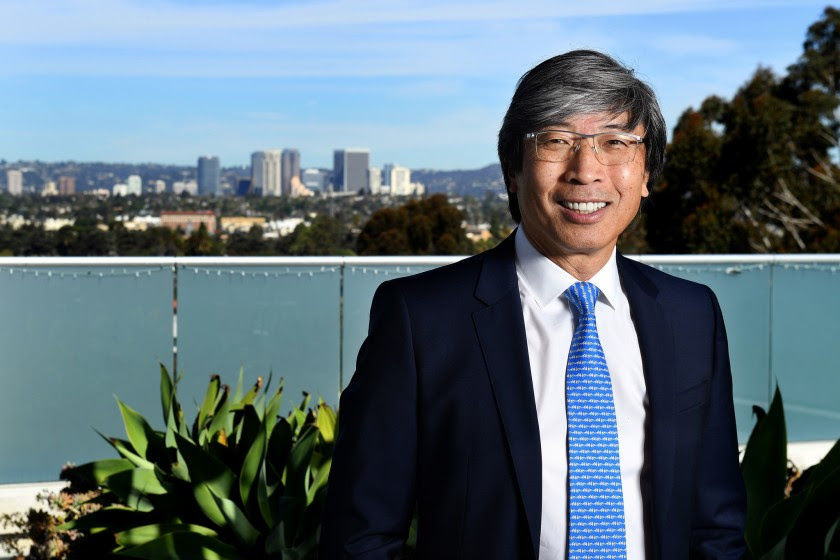 “The Soon-Shiongs invested heavily in rebuilding The Times. Then, last spring, tens of millions in anticipated advertising revenue evaporated when the government ordered businesses to shut down to limit the spread of COVID-19. Many of the paper’s advertising partners, some facing economic ruin, pulled back their ad buys. Although the revenue picture has improved in recent months, and in March The Times received a $10-million loan as part of the federal Paycheck Protection Program, the paper still loses money.
“The Soon-Shiongs invested heavily in rebuilding The Times. Then, last spring, tens of millions in anticipated advertising revenue evaporated when the government ordered businesses to shut down to limit the spread of COVID-19. Many of the paper’s advertising partners, some facing economic ruin, pulled back their ad buys. Although the revenue picture has improved in recent months, and in March The Times received a $10-million loan as part of the federal Paycheck Protection Program, the paper still loses money.
“Last year’s financial volatility sharpened the company’s focus on attracting — and retaining — digital subscribers to become less reliant on a shrinking pool of print subscribers and advertisers. The paper has 327,250 Sunday print subscribers.
“The Times now averages 45 million unique visitors monthly to its digital site, and it has more than doubled its online subscribers in the last two years. But the paper has fallen well short of the ambitious goals for digital customers set by Soon-Shiong, who would like to see the organization draw as many as 3 million subscribers.
“The Times has nearly 400,000 digital-only subscribers, which includes those who subscribe through Apple News+, the Cupertino tech giant’s paid subscription news service. It lags far behind major East Coast papers: The New York Times boasts more than 6 million digital subscribers and the Washington Post has nearly 3 million.
“Such challenges were part of the allure of the job, Merida said.
“ ‘I was motivated by the challenge and by a little bit of that underdog spirit,’ Merida said. ‘Also the commitment that Patrick and Michele, and their daughter Nika, have [to the paper] and their commitment to the area. Their story — growing up and living in South Africa and seeing all of the challenges of that country — and that they want an institution that is a reflection of the community.”
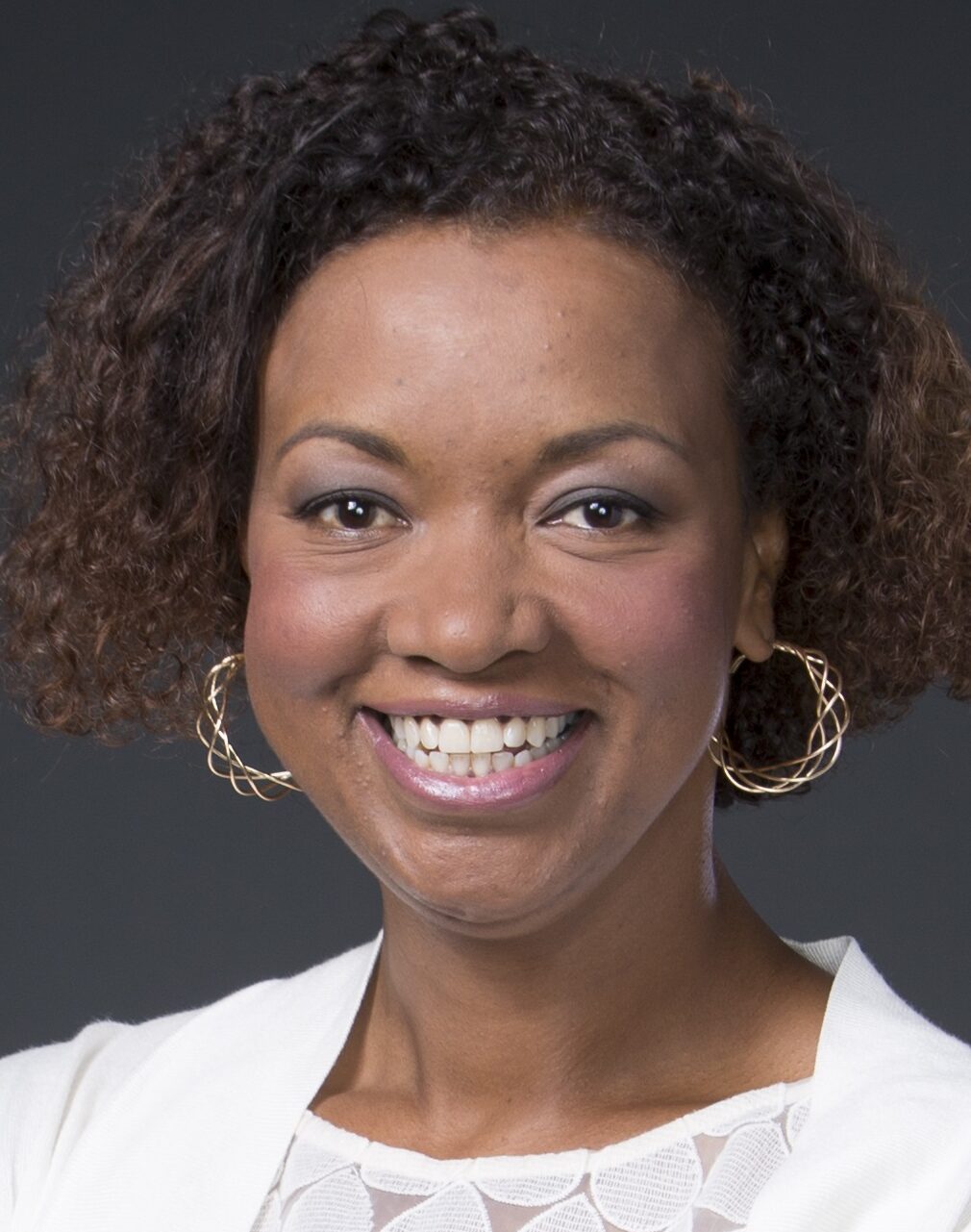 Kelley (pictured) was Merida’s first senior management hire at The Undefeated, ESPN said. And as such, “Kelley has been instrumental in the platform’s growth and helped steer The Undefeated’s content expansion across The Walt Disney Company unit via the ‘Music For The Movement’ series, a collaboration with Disney Music Group’s Hollywood Records.
Kelley (pictured) was Merida’s first senior management hire at The Undefeated, ESPN said. And as such, “Kelley has been instrumental in the platform’s growth and helped steer The Undefeated’s content expansion across The Walt Disney Company unit via the ‘Music For The Movement’ series, a collaboration with Disney Music Group’s Hollywood Records.
“She leads ESPN’s Black History Always, a companywide content initiative powered by The Undefeated that highlights the contributions of African Americans through long- and short-form storytelling across media platforms beyond the traditional 28-day Black history month in February,” a news release said.
It continued, “Before The Undefeated, Kelley served as deputy editor at ESPN The Magazine, where she was a leading driver of ESPN’s long-form journalism across different platforms (print, digital and audio-visual) and worked closely with some of the company’s leading storytellers. She joined ESPN in May 2011 as a senior editor at ESPN The Magazine, responsible for the publication’s coverage of the National Football League, tennis, action sports, the Olympics and ESPN Enterprise Unit. She was part of the senior editorial leadership team responsible for successfully merging ESPN’s print and digital content units under one umbrella.
“ ‘Kevin has been an outstanding leader, an amazing teacher and mentor to our team,’ said Raina. ‘I assume this responsibility knowing he has left behind a brilliant team of creative minds at The U that will continue this vision well into the future.’ ”
ESPN said, “The management team at The Undefeated that will report to Kelley remains unchanged: Deputy Editor Steve Reiss, Jason Aidoo, who joined the project in December as Vice President for Content Business Strategy and Operations, Monique Jones, Managing Editor, responsible for daily news coverage and digital content, and Sharon Matthews, Senior Director, Original Content Programming, Production and Development.”
- Jon Allsop, Columbia Journalism Review: Kevin Merida takes the top job at the LA Times (May 4)
- Tom Jones, Poynter Institute: A look inside the LA Times’ hiring of Kevin Merida as its next editor
- National Association of Black Journalists: Longtime NABJ Member Kevin Merida Named LA Times Executive Editor
- Katie Robertson, New York Times: Los Angeles Times Hires Its Next Top Editor: Kevin Merida, of ESPN

Alcindor Named Moderator of ‘Washington Week’
“Last month, when Yamiche Alcindor learned she would become the next moderator of the PBS current-affairs show ‘Washington Week,’ she immediately felt the emotion of the moment, Michael M. Grynbaum reported Tuesday for The New York Times.
“ ‘I basically instantly cried,’ Ms. Alcindor recalled, ‘thinking about Gwen.’
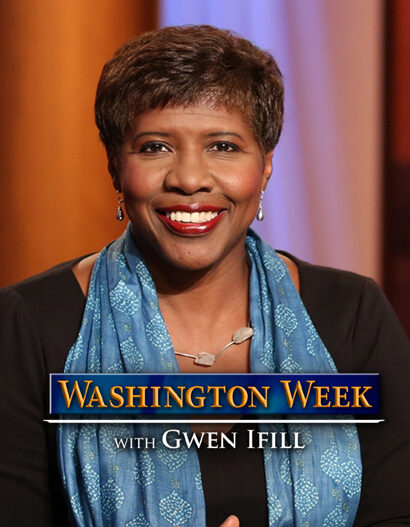 “ ‘Washington Week,’ a calm redoubt in the shouty battleground of political television, is most closely associated with its longtime moderator Gwen Ifill (pictured), the pioneering journalist who broke barriers as a Black woman in the Washington press corps.
“ ‘Washington Week,’ a calm redoubt in the shouty battleground of political television, is most closely associated with its longtime moderator Gwen Ifill (pictured), the pioneering journalist who broke barriers as a Black woman in the Washington press corps.
“Before her death in 2016, Ms. Ifill also became a mentor to Ms. Alcindor, the White House correspondent at ‘PBS NewsHour.’ Starting with the episode on Friday, Ms. Alcindor, 34, will take Ms. Ifill’s old chair at the helm of ‘Washington Week.’ She succeeds Robert Costa, a reporter for The Washington Post who took over in 2017 and left the show this year.
“PBS and WETA-TV, the Washington affiliate that produces the program, announced the appointment of Ms. Alcindor on Tuesday. . . .”
Grynbaum also wrote, “Ms. Alcindor will continue to cover President Biden for ‘NewsHour’ while also staying on as a contributor to NBC News and MSNBC. Previously, she was a reporter for The New York Times and USA Today. . . .”
In 2020, Alcindor was named Journalist of the Year by the National Association of Black Journalists.
- National Association of Black Journalists: Alcindor’s Appointment as Washington Week Moderator Keeps Ifill’s Legacy Alive
Who Was Bernadette? Who Was Mrs. Jones?
May 3, 2021
Journalists Hear From Philly Int’l, Motown Museum
Support Journal-ismsJournalists Hear From Philly Int’l, Motown Museum
Most Americans stop discovering new pop music in their 30s, surveys show, and while the reasons are varied, for many, it’s simply that the music was so much better then.
Maybe it was the times, suggested Kenny Gamble and Leon Huff, who launched the “Philly Sound” of the 1970s, and Robin R. Terry, CEO of the Motown Museum, created to honor the Detroit sound and record company so prominent in the 1960s. They appeared Tuesday at an eagerly anticipated Journal-isms Roundtable, conducted via Zoom.
Philly’s musical lions came along “when our community was . . . happy,” Gamble, who is 78, told the group. “I mean, more happy than they are today. . . . You could stand out on the corner and sing a little bit and nobody ran down the street shooting you down.”
 Terry (pictured, by Sharon Farmer/sfphotoworks), 37, mentioned aspirations to wealth that continue today. But, she, too, noted that the difference in the times has not necessarily been positive. “It’s about the character that it has to come with the wealth, right? Because you get a lot of folks who get money, and then their character, you know, they lose whatever sort of advantage they have with money because the character isn’t there. Motown was about character, and it was about excellence. And it was about values.”
Terry (pictured, by Sharon Farmer/sfphotoworks), 37, mentioned aspirations to wealth that continue today. But, she, too, noted that the difference in the times has not necessarily been positive. “It’s about the character that it has to come with the wealth, right? Because you get a lot of folks who get money, and then their character, you know, they lose whatever sort of advantage they have with money because the character isn’t there. Motown was about character, and it was about excellence. And it was about values.”
Terry added that to her regret, Black entrepreneurship is on the decline.
Gamble and Huff are commemorating the 50th anniversary of Philadelphia International Records, which, The New York Times declared, “turned a city’s aesthetic into a movement that reverberated around the world.” The O’Jays, Teddy Pendergrass, Lou Rawls and Patti LaBelle were among those who recorded for the label. The pair collaborated with Thom Bell, who produced such groups as the Spinners and the Stylistics.
 The Motown Museum is planning an expansion of its landmark Detroit location and is celebrating the 50th anniversary of Marvin Gaye’s contribution to pop music history, his “What’s Going On” album. Terry is granddaughter of the late Esther Gordy Edwards, who founded the museum in 1985, was a senior executive at Motown Records and a sister of Motown founder Berry Gordy Jr. She was joined at the roundtable by Iris Gordy (pictured), 78, a former Motown executive and museum board member.
The Motown Museum is planning an expansion of its landmark Detroit location and is celebrating the 50th anniversary of Marvin Gaye’s contribution to pop music history, his “What’s Going On” album. Terry is granddaughter of the late Esther Gordy Edwards, who founded the museum in 1985, was a senior executive at Motown Records and a sister of Motown founder Berry Gordy Jr. She was joined at the roundtable by Iris Gordy (pictured), 78, a former Motown executive and museum board member.
Seventy-five people were on the Zoom call. A Facebook simulcast had reached 782 people by the following Monday, but was sabotaged by technological glitches. You can watch the Zoom call here: < https://www.youtube.com/watch?v=WL2ETb8S9m0 >
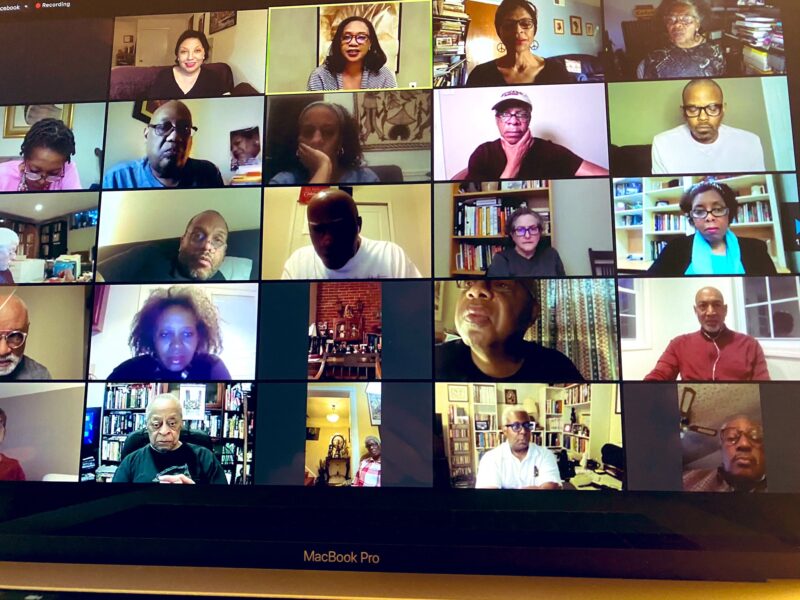
For many on the call, the speakers were discussing the soundtrack of their lives. Sam Fulwood III, who starts Monday as dean of the American University School of Communication, described himself as “a huge Motown fan,” adding, “And for about three years when I was in Cleveland, I taught a course on the life and times of Marvin Gaye and how Motown changed America through the 60s and 70s.”
Jackie Jones, assistant dean for programs and chair of the Department of Multimedia Journalism at Morgan State University, disclosed that her cousin headed a Marvelettes fan club.
An 11-minute video on Philadelphia International Records, distributed to attendees before the roundtable, was narrated by former Philadelphia anchor Arthur Fennell, a past president of the National Association of Black Journalists.
It’s not unusual for journalists to be music fans in their off-hours, even playing in rock, jazz, blues or country music bands or, in a previous era, singing street corner doo-wop.
But they framed their questions for the guests as journalists would. Syndicated columnist Leonard Pitts Jr., a former music writer, asked them to, for example, “Compare the musicality of the PIR days to now. Horn players are almost extinct now, for instance. Have electronics and sampling made the sound less organic?”
Nichelle Smith, USA Today enterprise editor for racism and history, asked Gamble and Huff, “You said just a little so far about how other artists covered your music and how frustrating that could be. So where do you stand on the issue of cultural appropriation as it plays out today? Is it always a bad thing?”
Tannette Elie, a onetime Milwaukee business reporter and columnist now teaching at the University of Wisconsin-Parkside, echoed questions about the role of the guests’ music in social justice movements. “Have you thought about partnering with public schools to have Motown’s history included in curriculum?” she asked. “I really fault the schools for not educating our children on this important and rich history. After all, Motown was pivotal to the civil rights and social justice.”
There were questions about individual artists, such as Pendergrass and Phyllis Hyman, and about how the music was made. Shout-outs went to specific songs, such as the O’Jays’ “For the Love of Money” and the Four Tops’ “Bernadette,” or “Ain’t No Stopping Us Now,” the McFadden and Whitehead tune that some attendees said they played at their high school or college graduations.
It was not lost on the questioners that in the speakers’ heydays, they represented the biggest-ever Black-owned record companies, functioning in a white-dominated industry with its own variety of racism.
Ben Sisario reported last month for The New York Times, “The Black Music Action Coalition, a group of artist managers, lawyers and others, was created last summer with a mission to hold the industry to account. In June, it intends to release a ‘report card’ on how well the various music companies have made good on their promises and commitments to progress.”
Gamble said he countered the racism by keeping his eyes on the prize.
 “There was a great man that I used to listen to, talk to, and I used to listen, talk to me. And he used to teach us to say, you know, do for yourself,” Gamble (pictured) said.
“There was a great man that I used to listen to, talk to, and I used to listen, talk to me. And he used to teach us to say, you know, do for yourself,” Gamble (pictured) said.
“. . . And that was Elijah Muhammad [who said], no matter what happened, that’s what we had to do, we had to do for ourselves, we had to get in and get the records played. . . . Because radio stations was owned by Caucasian people, and they picked the records they wanted to work on. So you had to work hard, you had to work night and day. And that’s it. . . . You can’t get anything unless you work, work for it. . . . we wrote a lot of songs, and we’ve done a lot of things with music, and worked with some wonderful artists. And I think that that was the key to me.”
Cultural appropriation? Gamble said he is glad to broaden his audience. “It’s still the same thing going on now in the world, about white people over here, and Black people over there. So once you can realize that, that’s where it is, you try to write something that’s gonna bust all that up. . . .You want to be the white people that don’t listen to Black music? Why was your feet jumping, when you hear that song ‘For the Love of Money‘?”
Pendergrass, whose appeal was such that he would give ladies-only concerts, “was one of the greatest artists we ever worked with.” Hyman, who died by suicide in 1995 after suffering from bipolar disorder and depression, “was rumbling with herself, you know, it’s not easy when you got something like that going on in your head. . . . but I listen to the work that she left and the work she did with us. You know, it’s beautiful music going to be around forever.”
As he has in other venues, Huff explained that the top-selling 1972 Billy Paul hit “Me and Mrs. Jones” was based on a real-life experience.
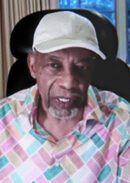 Huff (pictured), 79, also disclosed such tricks of his trade as placing drug-store thumb tacks behind the hammer keys of an upright piano to make it sound like a synthesizer or harpsichord.
Huff (pictured), 79, also disclosed such tricks of his trade as placing drug-store thumb tacks behind the hammer keys of an upright piano to make it sound like a synthesizer or harpsichord.
When Wayne Dawkins, who teaches journalism at Morgan State University, declared his love for the Four Tops song “Bernadette,” Terry replied with a surprise. “I’m not gonna kid you. I met Bernadette. That’s all. This is the truth. I was at an event, this woman came up and tapped me on the shoulder and introduced herself.”
Gordy was alarmed to learn that succeeding generations aren’t always aware of Motown. Terry explained why that helps motivate her work.
“One day, I’m sitting in church, I was worn out, because we’re raising $55 million to build this, we’re
well, well, well over the halfway mark. And I’m sitting in church in the pew and I said, ‘Lord, you got to
give me my own reason to fight for this.’ Because I was running out of steam. And in that moment, what dropped in my spirit was ‘imagine the world without it.’
“And I started imagining not only the world not having the Motown sound, this music that, you know, allowed us to connect no matter where we came from in the planet. I started imagining nationally, what would it look like if we didn’t have it, this music about Black people and white people together and broke down racial barriers.
“But then I was thinking locally, what if little Black boys and girls and not just Black, but particularly young Black boys and girls, looked [at] something that represented that level of success and excellence in the world? Something from people that look like them? And that became my motivation every day for getting up to fight for the vision that you saw.”
As for “What’s Going On,” “it’s as relevant today as it was over 50 years ago,” Terry said. “Smokey Robinson tells the story of you know, talking to Marvin, while he’s writing ‘What’s Going On.’ And Marvin said, ‘Man, God is writing this album.’ It is profoundly wonderful how that song and every lyric in it today resonates with people the way that it does, and resonates as truth.
“I also think . . . it’s really critically important to celebrate, because it also represents the importance of having a voice in the world, and to, you know, speaking whatever that truth is, be it a protest or anything else. . . . We’re celebrating ‘What’s Going On’ for the entire year through programming with youth and street namings, and all of that good stuff. But all of it is about, you know, finding your voice and being able to share it with the world.”
COVID had the silver lining of adapting a “What’s Going On” workshop for a virtual audience. “It’s through a program called the Lyric Project.
“If we were back at home in Hitsville, we would have done that program for 40 students,” Terry said. We ended up doing for almost 200 students up in five states across this country. Because it was a virtual platform. We partnered with AARP and did a dance party for over 34,000 people. And we wouldn’t have done that. . . . We did a Yelp virtual exhibit with over 12,000 people. So we learned something. We gained something that we won’t give up once we go back into our space full time.”
CNN plans a special. “What’s Going On: Marvin Gaye’s Anthem For The Ages,” (video clip) next Sunday, May 9, at 8 p.m. Eastern. CNN’s Don Lemon will anchor.
Terry urged the attendees to join the museum.
Gamble had encouraging words for journalists who want to try their hand at songwriting. “I think when you’re writing a song is pretty much the same as writing a column,” he said. “You got a
beginning. You got a middle, and you got an end. You got to have a story.
“You know, but you guys you can write a good story. You know, it’s time now to write about something positive. . . . So when you write your stories, tell ’em, Gamble and Huff, they all right.”
- Dan DeLuca, Philadelphia Inquirer: Saving Sigma Sound: Fans and preservationists hope the Sound of Philly studio can become a music museum (March 6)
- Dan DeLuca, Philadelphia Inquirer: Gamble and Huff celebrate the 50th year of Philadelphia International Records defining Philly sound (Jan. 25)
- Hashim Hathaway, Yardbarker: Hitsville USA: The 20 greatest Motown singles
- Daniel Kreps, Rolling Stone: Marvin Gaye’s ‘What’s Going On’ Gets 50th Anniversary Digital Reissue (Jan. 22)
- Alan Light, New York Times: 50 Years Later, Gamble and Huff’s Philly Sound Stirs the Soul (Feb. 25, updated Feb. 26)
- Aaron Mondry, Curbed Detroit: New animation shows full scale of $50M Motown Museum expansion (Feb. 12, 2020)
- Motown Museum: A Bold New Future
Photos by Sharon Farmer/sfphotoworks except where noted.
Support Journal-ismsTo subscribe at no cost, please send an email to journal-isms+subscribe@groups.io and say who you are.
Facebook users: “Like” “Richard Prince’s Journal-isms” on Facebook.
Follow Richard Prince on Twitter @princeeditor
Richard Prince’s Journal-isms originates from Washington. It began in print before most of us knew what the internet was, and it would like to be referred to as a “column.” Any views expressed in the column are those of the person or organization quoted and not those of any other entity. Send tips, comments and concerns to Richard Prince at journal-isms+owner@
View previous columns (after Feb. 13, 2016).
View previous columns (before Feb. 13, 2016)
- Diversity’s Greatest Hits, 2018 (Jan. 4, 2019)
- Book Notes: Is Taking a Knee Really All That? (Dec. 20, 2018)
- Book Notes: Challenging ’45’ and Proudly Telling the Story (Dec. 18, 2018)
- Book Notes: Get Down With the Legends! (Dec. 11, 2018)
- Journalist Richard Prince w/Joe Madison (Sirius XM, April 18, 2018) (podcast)
- Richard Prince (journalist) (Wikipedia entry)
- February 2018 Podcast: Richard “Dick” Prince on the need for newsroom diversity (Gabriel Greschler, Student Press Law Center, Feb. 26, 2018)
- Diversity’s Greatest Hits, 2017 — Where Will They Take Us in the Year Ahead?
- Book Notes: Best Sellers, Uncovered Treasures, Overlooked History (Dec. 19, 2017)
- An advocate for diversity in the media is still pressing for representation, (Courtland Milloy, Washington Post, Nov. 28, 2017)
- Morgan Global Journalism Review: Journal-isms Journeys On (Aug. 31, 2017)
- Diversity’s Greatest Hits, 2016
- Book Notes: 16 Writers Dish About ‘Chelle,’ the First Lady
- Book Notes: From Coretta to Barack, and in Search of the Godfather
- Journal-isms’ Richard Prince Wants Your Ideas (FishbowlDC, Feb. 26, 2016)
- “JOURNAL-ISMS” IS LATEST TO BEAR BRUNT OF INDUSTRY’S ECONOMIC WOES (Feb. 19, 2016)
- Richard Prince with Charlayne Hunter-Gault,“PBS NewsHour,” “What stagnant diversity means for America’s newsrooms” (Dec. 15, 2015)
- Book Notes: Journalists Follow Their Passions
- Book Notes: Journalists Who Rocked Their World
- Book Notes: Hands Up! Read This!
- Book Notes: New Cosby Bio Looks Like a Best-Seller
- Journo-diversity advocate turns attention to Ezra Klein project (Erik Wemple, Washington Post, March 5, 2014)

